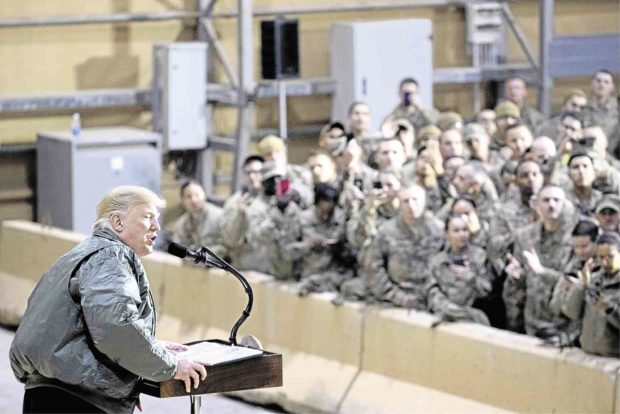Iraqi lawmakers blast Trump visit as blow to sovereignty

DISPUTED VISIT In a surprise trip to Iraq, US President Donald Trump speaks to the troops at a hangar of Al-Asad Air Base, west of Baghdad, on Wednesday. AP
BAGHDAD—Iraqi political and militia leaders condemned US President Donald Trump’s surprise visit to US troops in Iraq on Wednesday as a violation of Iraq’s sovereignty, and lawmakers said a meeting between Trump and Iraqi Prime Minister Adel Abdul-Mahdi was canceled due to a disagreement over venue.
Sabah al Saadi, the leader of the Islah parliamentary bloc, called for an emergency session of parliament “to discuss this blatant violation of Iraq’s sovereignty and to stop these aggressive actions by Trump who should know his limits: The US occupation of Iraq is over.”
The Bina bloc, Islah’s rival in parliament and led by Iran-backed militia leader Hadi al-Amiri, also objected to Trump’s trip to Iraq.
“Trump’s visit is a flagrant and clear violation of diplomatic norms and shows his disdain and hostility in his dealings with the Iraqi government,” Bina said a statement.
In an unannounced trip to Al-Asad Air Base here on Wednesday, Trump staunchly defended his decision to withdraw US forces from neighboring Syria despite a drumbeat of criticism from military officials and allies who don’t think the job fighting Islamic State militants there is over.
Article continues after this advertisementFirst visit to troops
Article continues after this advertisementTrump, making his first presidential visit to troops in a troubled region, said it was because the US military had all but eliminated Islamic State-controlled territory in both Iraq and Syria that he decided to withdraw 2,000 forces from Syria.
He said the decision to leave Syria showed America’s renewed stature on the world stage and his quest to put “America first.”
“We’re no longer the suckers, folks,” Trump told US servicemen and women at the air base in western Iraq, about 160 kilometers west of Baghdad. “We’re respected again as a nation.”
The decision to pull out US forces from Syria, however, stunned national security advisers and US allies and prompted the resignations of Defense Secretary Jim Mattis, who was not on the trip, and the US envoy to the coalition fighting the Islamic extremist group.
The militant group, also known as Isis, has lost nearly all its territory in Iraq and Syria but is still seen as a threat.
Air Force One, window shutters drawn, flew overnight from Washington, landing at the air base on Wednesday evening. George W. Bush made four trips to Iraq as president and President Barack Obama made one.
During his three-plus hours on the ground, Trump did not meet with any Iraqi officials.
No force withdrawal
Trump said he had no plans to withdraw the 5,200 US forces in Iraq. That’s down from about 170,000 in 2007 at the height of the surge of US forces to combat sectarian violence unleashed by the US-led invasion to topple dictator Saddam Hussein.
But Abdul Mahdi’s office said in a statement that US authorities had informed Iraq’s leadership of Trump’s visit ahead of time. The statement said the Iraqi prime minister and US president talked by telephone due to a “disagreement over how to conduct the meeting.”
Iraqi lawmakers told Reuters that the pair had disagreed over where their planned meeting should take place: Trump had asked to meet at the Ain al-Asad military base, an offer which Abdul Mahdi declined.
Trump’s visit comes amid a backdrop of escalating tensions between Washington and Tehran, as Washington seeks to counter Iran’s sway in the Middle East.
Falih Khazali, a former militia leader turned politician allied with Bina, accused the United States of wanting to increase its presence in Iraq.
“The American leadership was defeated in Iraq and wants to return again under any pretext, and this is what we will never allow,” he said.
Bina said Trump’s visit “places many question marks on the nature of the US military presence and its real objectives, and what these objectives could pose to the security of Iraq.”
Islah is headed by populist Shiite cleric Moqtada al-Sadr.
Uprisings against US
Sadr has long opposed the US presence in Iraq since the US-led invasion toppled Saddam Hussein in 2003. He led two uprisings against US forces in Iraq and is one of the few Shiite leaders to also distance himself from Iran.
Iraq’s Shiite militias, also known as the PMF, many of which are supported by Iran, oppose the presence of US troops in the region. The PMF was made formally part of the security forces this year after helping the military defeat Islamic State in Iraq in 2017.
Qais al-Khazali, the leader of the powerful Iran-backed Asaib Ahl al-Haq militia, said on Twitter, “Iraqis will respond with a parliamentary decision to oust your (US) military forces. And if they do not leave, we have the experience and the ability to remove them by other means that your forces are familiar with.”
Some Iraqis, however, were less concerned with Trump’s visit.
“We won’t get anything from America,” said Baghdad resident Mohammad Abdullah. “They’ve been in Iraq 16 years, and they haven’t given anything to the country except destruction and devastation.” —AP